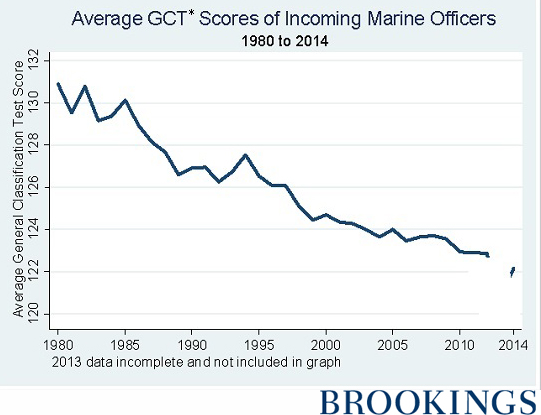 |
The GCT has a mean of 100 and a standard deviation of 20. A score of 120 is roughly equivalent to an IQ of 115. I wonder what the IQ scores of the Chinese officer class look like? |
"Through a Freedom of Information Act (FOIA) request to the Marine Corps, Klein and Cancian received data on the GCT scores of all officers—46,000 altogether—from Fiscal Year 1980 to Fiscal Year 2014.
After analyzing the data, the authors uncovered a startling trend: A statistically significant decline in scores over the past 34 years, the magnitude of which, the authors say, “is relevant given the distribution of the scores.”
Other key findings include:
- Eighty-five percent of those taking the test in 1980 exceeded a score of 120, which was the cut-off score for officers in World War II. In 2014, only 59 percent exceeded that score.
- At the upper end of the distribution, 4.9 percent of those taking the test scored above 150 in 1980 compared to 0.7 percent in 2014.
- Over 34 years, the average score decreased by 6.6 percent, from 130.9 to 122.1.
- Taken together, the 8.2-point drop in average score represents 80 percent of an entire standard deviation’s decline (from 10.5 in 1980 to 9.6 in 2014). In other words, today’s Marine officers scored nearly an entire standard deviation worse, on average, than their predecessors 34 years ago.Klein and Cancian stress the importance of acknowledging and reversing the decline in officer quality as measured by the GCT score not just for the short-term impacts it has. The junior officers of today will become the generals of tomorrow; if the military does not receive the intelligent young leaders today that it used to receive in the past, it will not have high quality generals in the future.
“What has been the impact of this drop in quality on the effectiveness of the military? Answering this question is beyond the scope of this paper. Given the myriad studies associating performance with intellect, however, it is hard to imagine anything other than a seriously deleterious impact on the quality of officers and, by extension, on the quality and efficacy of the military,” say the authors.
No comments:
Post a Comment
Note: Only a member of this blog may post a comment.